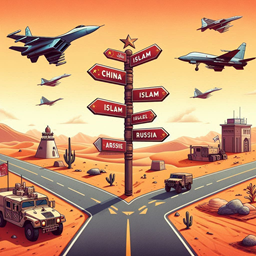By Ron Raskin

Different parts of the Western world see global threats in different ways. Europe tends to see Russia as its biggest threat, followed by Radical Islam and then China. On the other hand, the United States seems to view China as the main concern, then Radical Islam, with Russia as the least important.
While these priorities might make sense in the short term, they seem off in the long run. Russia is more of a secondary power—it’s trying to act like a major player, but without much success. Its share in the global energy market is shrinking, its population is declining, and it likely won’t be able to keep up its ambitions for much longer.

China is clearly a rising world power and will challenge Western democracies in many ways—through trade disputes, a new cold war, and more. But China’s population is aging, shrinking, and becoming wealthier. It has more to lose than to gain from total conflict. So while China is definitely a rival and even an adversary, it’s not an existential threat.
The only real existential threat to the West—and possibly to the whole world, including Russia, China, and India—is Islamic Fundamentalism. It aims to build a unified and aggressive Islamic empire. At the start of the 20th century, Muslims made up just over 10% of the world’s population; now they make up about a quarter, and their numbers are still growing. Meanwhile, Europeans have dropped from around 28% of the global population to less than 10%. Those who think that Islamic Fundamentalism won’t seek its own ‘Lebensraum’ probably don’t understand human nature.

Trump’s visit to the Middle East, along with his relatively low interest in European issues, focused more on economic competition with China. His strategy prioritized economic strength—cutting war spending in places like Yemen and Russia, and making deals with countries like Saudi Arabia. Economic power is important, especially when dealing with China—but is it the right focus?
If Islamic Fundamentalism is the real threat, then focusing mainly on China might be a strategic mistake. Confronting that kind of threat will require more than just economic and technological strength. It will also need efforts to prevent the spread of nuclear weapons (including to Saudi Arabia) and to manage demographic trends. But those don’t seem to be top priorities for the current U.S. administration.
So the question is: Is the U.S. investing in the wrong challenge?

